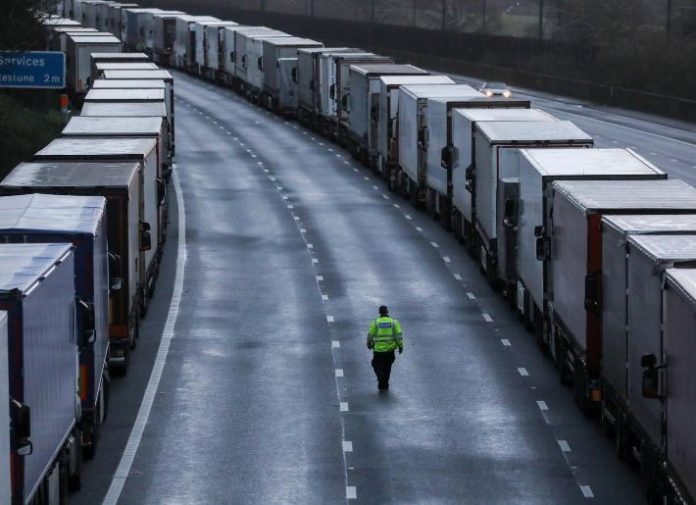France will reopen its borders to passengers from England on Wednesday, ending a blockade intended to stop the spread of a new coronavirus variant, but which has held up thousands of lorries before Christmas.
Much of the world shut its borders to Britain after a significantly more transmissible mutated coronavirus variant was discovered spreading swiftly across southern England.
With queues of trucks snaking to the horizon in England and some supermarket shelves stripped just days before Christmas, British Prime Minister Boris Johnson scrambled to get French President Emmanuel Macron to lift a ban on freight from Britain.
Late on Tuesday a deal was reached with Paris to allow French and other EU residents to return home, providing they have a negative COVID test that is less than 72 hours old.
Britain said it would begin handing out tests at multiple locations on Wednesday, but cautioned that the process would take time.
“We’ll be making sure that tomorrow we’re out there providing tests,” Shapps said. “This will take two or three days for things to be cleared.”
Truckers were told not to travel to the Kent region where the most heavily used rail and ferry links are..
Earlier the European Commission advised that non-essential travel to and from Britain should be discouraged but said that people heading home should be allowed to do so, provided they undergo a COVID-19 test or quarantine for 10 days.
However, border controls are governed by national policy, so each EU country can have its own rules.
Shapps said France had agreed to accept the results of “lateral flow” COVID tests which have been used in other mass testing programmes. They typically give results within an hour.
The discovery of the new variant, just months before vaccines are expected to be widely available, sowed a fresh wave of panic in a pandemic that has killed about 1.7 million people worldwide and more than 67,000 in Britain.
Scientists say there is no evidence that vaccines currently being deployed in Britain – made by Pfizer and BioNTech – or other COVID-19 shots in development will not protect against this variant, known as the B.1.1.7 lineage
FOOD SUPPLY WORRIES
The United Kingdom’s effective COVID-19 quarantine came just nine days before it is due to part ways with the EU after a transition period – considered to be one of the biggest changes in post-World War Two British history.
Countries across Europe and beyond have suspended travel from Britain since the weekend. Germany imposed a ban on UK travellers from Tuesday that could remain in place until Jan. 6.
One exception was the United States, which does not intend to impose COVID-19 screenings for passengers from Britain.
Cases of the new strain have also been detected in some other countries, including Denmark and Italy. Experts said the prevalence in Britain might be down to better detection.
Britain’s border crisis led to some panic-buying: shoppers stripped shelves in some supermarkets of turkey, toilet rolls, bread and vegetables.
While the government said there was enough food for Christmas, market leader Tesco and No. 2 player Sainsbury’s both said food supplies would be affected if the disruption continued. Tesco said it had imposed temporary buying limits on some essential products.
Britain said 632 trucks were stacked up on the M20 motorway in Kent, southern England, and 2,188 at nearby Manston Airport, now being used as a giant lorry park. The government said additional toilets and food vendors were being arranged, after the Road Haulage Association raised concerns about drivers’ welfare.
While trucks were still able to cross from France to Britain, they could not return so European truck drivers were extremely reluctant to travel.
The border closures were causing headaches across Europe, especially for those trying to transport perishable food. Milk suppliers were already trying to boost milk stocks in Britain ahead of Brexit.
“The plan was to stock up in the next 10 days so if there is a Brexit problem there are stocks for January,” said Alexander Anton, the secretary general of the European Dairy Association. “Now you can’t find a transport company to send a driver to the UK.”
Lactalis, the world’s biggest dairy company, has had to reschedule some lorry deliveries to Britain because of the border closure, a spokesman for the French group said.
Television footage showed a small group of people arguing with police at the entrance to the Dover port.
Elsewhere, drivers, some swearing about Johnson and Macron, said they just wanted to get back home in time for Christmas
















